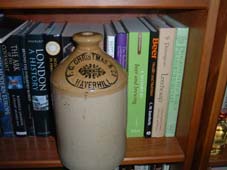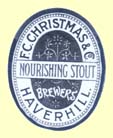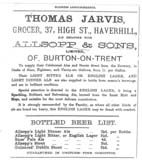

What better way to celebrate the festive season
than
to drink a toast with a beer with the very name ‘Christmas’.
Uniquely, the good people of Haverhill were able to do just this around
the turn of the 20th century, for the town boasted a brewery with the
name of ‘Christmas & Co.’
The Early Days
Our story starts in 1809, when the brewery was set up in
Camps Road (then part of Essex) by one Joseph Boreham, and the business
was to stay in the same family for around seventy years.
Joseph was still listed as ‘Brewer, Wine and Spirit Merchant’
during the period 1844-1855, but, by 1864, his son, William had succeeded
him.
William, born 1804, was a successful man, and had other
business interests in London and Manchester.
He was a noted amateur astronomer and anthropologist, and contributed
to several academic reports, as well as being a local JP. William retired
in 1885, and went to live at The Mount in the High Street, and, some time
between 1874 and 1885, the ‘Haverhill Brewery’, as it was
now known, was sold to a William Ward (the brewery trading under the name
of Wm. Ward & Son).
It is highly likely that there was a family connection between the owners
of this brewery, and those who started the Foxearth brewery of the same
name (Ward’s of Foxearth), founded by George Ward in 1848.
In hindsight, these were probably the wrong times to make
such a purchase, because the peak of beer consumption in Britain had just
been passed, and there was ferocious country-wide competition for trade,
between the larger brewers from London and Burton-on-Trent, and the smaller
regional concerns.
This is exemplified by the advert placed by local grocer, Thomas Jarvis,
in the November 17th, 1888 copy of the South-West Suffolk Echo, which
shows that beer from the Burton brewer Allsopp’s was readily available
in the town at 1/- per gallon!
The Christmas Brewery
Up for Sale
William and his son only owned the Haverhill enterprise
for around twenty years, for on 23rd January 1894, it was put up for auction
at the Mason’s Hall, London, EC.
The description of the lot makes interesting reading, for it was described
as:
‘An old-established, tower-built brewery of 3 acres, plus 36
freehold and copyhold fully-licensed houses, with other land and property
giving a rental in excess of £1,000 per annum’.
Such a sum would represent well over £1million by
today’s standards. Besides the brewery, there were included in the
lot,
‘two fifteen quarter malt houses, and two residences and grounds,
namely ‘Dabel House’ and ‘The Limes’ ‘
The Maltings were across the Camps Road from the brewery, and are now
the site of the Health Centre.


Christmas Ales
The Wards must have been quite successful because
their trade covered an area that included Castle Hedingham, Saffron Walden,
Fulbourn and Swaffham Bulbeck.
At the auction, the lot was sold to Frederick Charles Christmas for £29,000,
and so ‘F.C.Christmas & Co.’ was born.
From the accounts for 1890-1892, which were available at the auction, it was clear that, whilst beer sales were falling, the sales of wines, spirits, yeast and grain were on the increase. Spent grains were sold to local cattle farmers, and yeast was sold to local bakeries, and those of the landed gentry who still brewed their own beer.
The actual brewery in Great Thurlow was situated behind
the now defunct ‘Rose and Crown’, and brewing had actually
ceased there on the demise of Mr Wootten in 1910.
The outbreak of the First World War in 1914, and the following four years
of attrition, were to change the British brewing industry forever, and
whatever hardships were endured during the conflict, such as the introduction
of restricted licensing hours, and a more vigorous temperance movement,
the post-war years would prove to be even more difficult.
On the death of F.C.Christmas in 1918, the brewery and 49 public houses were sold to Greene King & Sons, Ltd. (as they were then called) for £55,000, a sum that was delivered in cash and War Bonds.
Greene King continued to brew in Haverhill
until the end of 1924, when with the
decreasing amount being brewed there
(down to 3,480 barrels in that year, as
compared to 11,000 barrels in 1920), the
site became non-viable.
The sharp recession had resulted in this
fall in beer sales, and it became evident
that the needs of Haverhill could be met by
lorry delivery from Bury St Edmunds.
Although called the ‘Haverhill Brewery’, the concern was not
the only commercial brewery in the town, for, at various times, there
were Ernest Ingold (later Henry Loveday) in Chauntry Road in the 1920’s,
and Harry Pannell in Chauntry Place, at the end of the 19th century.
I.S.Hornsey,
November 2006
In January 1913, Christmas purchased the brewery
and five public houses belonging to Wm. Wootten’s
Great Thurlow Brewery for £4,100, and this served to expand the
business even further.
